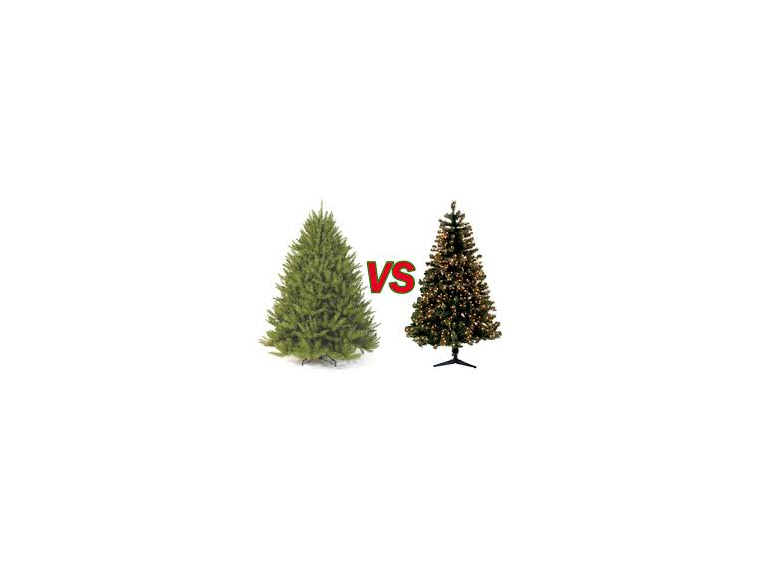
Did you know that the first artificial Christmas trees were actually made in the early 1930′s by a company called Addis Brush? They were in the business of making toilet scrubbers and brushes.
Since being invented, artificial trees have gained widespread popularity. It’s commonly believed that buying an artificial Christmas tree saves money. You invest the money once, and use the tree year after year. Plus, you help the environment by saving a tree from being cut down. So really, buying an artificial tree over a real one is a no brainer, right?
Well, not really. There are advantages and disadvantages to both sides of the “real” versus “fake” debate when it comes to Christmas trees. We look at the various pros and cons so you can make the best decision for you and your family this holiday season.
Artificial Trees
The biggest argument in favour of artificial trees is that they can be reused year after year, therefore not using any new raw materials. However, this is rather undermined by the fact that plastic trees are used not for a "lifetime", but for an average of five or six times before being discarded to spend a few centuries degrading in a landfill.
BUT they don’t drop pine needles, which saves wasting electricity on hoovering!
There is the concern that artificial trees are typically made of polyvinylchloride (PVC), a product of the petrochemical industry and like kryptonite to greenies! Greenpeace have lobbied for the phasing out of PVC because they claim dioxins are produced as a by-product of its manufacture.
Artificial trees are often made overseas (in the East for instance) and although they can be bought by the end user for a realistic price, shipping increases the trees’ carbon footprint.
Real Trees
The Christmas tree industry says that the growing of trees helps to offset carbon dioxide emissions - it claims that one acre of trees absorbs the CO2 of 18 people! However, in the UK many Christmas tree retailers import their trees from Scandinavia, indicating that the carbon miles associated with the transport of your Christmas tree can undermine any environmental advantage of having a real tree!
About 7 million Christmas trees are grown and sold in the UK each year. Of these only 10% were recycled and fewer than 5% planted to be re-used next year (Defra).
The British Christmas Tree Growers Association is the trade association for companies that grow their trees in the UK and their website holds details of all of its members. A retailer that is a member of BCTGA will sell trees that are grown in the UK - and it will also be likely that their trees were locally grown.
There are Christmas tree farmers in the UK who use more sustainable farming methods. The Soil Association has certified some Christmas tree producers as organic growers or some farms may boast Forest Stewardship Council (FSC) accreditation.
It takes up to 10 years to grow a Christmas tree and in that time the tree is constantly taking in carbon dioxide and giving out oxygen. An acre can produce enough oxygen each day for 16 people.
Cut trees obviously won’t survive beyond Christmas, but many councils now have recycling schemes producing bark chippings that can be used in playgrounds, walking trails or for gardens.
One potential problem with real trees is any overuse of pesticides but try to find a grower who uses organic growing methods.
Local grown trees means local employment and supporting local economy!
As our commitment and support is to LOCAL businesses, Thebestof Barnstaple would like to encourage you to please visit any LOCAL garden centre, pick a real tree (great fun to do with the family or significant other) and place it as centre-piece in your front room.
A few places you may want to try on your search for the perfect tree are:
Trelawney @ Ashford, Strand Lane, Barnstaple, North Devon, EX31 4BW
St John's Garden Centre, St. John’s Lane, Barnstaple, Devon EX32 9DD
Gardener's Delight Nursery, Rooksbridge/Brynsworthy, Barnstaple EX31 2PA
Happy Tree Hunting!!!
I'm Sarah and I live just outside Barnstaple near Umberleigh.
I love sport especially rugby, cricket and golf and want to hear your thoughts on the site and add events and blogs on subjects that interest...
The following Cookies are used on this Site. Users who allow all the Cookies will enjoy the best experience and all functionality on the Site will be available to you.
You can choose to disable any of the Cookies by un-ticking the box below but if you do so your experience with the Site is likely to be diminished.
In order to interact with this site.
To help us to measure how users interact with content and pages on the Site so we can make
things better.
To show content from Google Maps.
To show content from YouTube.
To show content from Vimeo.
To share content across multiple platforms.
To view and book events.
To show user avatars and twitter feeds.
To show content from TourMkr.
To interact with Facebook.
To show content from WalkInto.